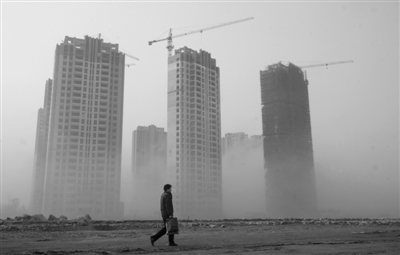Who pays for air pollution?

Over the past two days, a thick layer of smog has blanketed much of the country, casting a gray haze over the skies. According to recent measurements, more than half of the 80 national monitoring stations in Beijing, Tianjin, and Hebei have exceeded air quality standards for an extended period. In the Yangtze River Delta region, around one-third of the 129 cities also reported continuous air pollution levels above acceptable limits. Other major cities and provincial capitals are experiencing similar issues, with varying degrees of severity.
This recurring haze is not a new problem. In recent years, every autumn and winter, especially after the cold season sets in, China's central and eastern regions often face these challenges. The causes are both meteorological—such as stagnant air—and human-driven, including industrial emissions and vehicle exhaust.
So, what actions have authorities taken in response to such severe pollution? In Beijing, for example, the measures currently visible include online updates, social media posts, TV and radio alerts encouraging citizens to limit outdoor activities. However, basic public communication—like real-time pollution data or health advisories—remains lacking. It seems the government is still slow to respond effectively to this growing crisis.
Expanding information channels would be a crucial step. For instance, sending SMS alerts like weather warnings could help reach more people. Local communities, hospitals, and even motorcycle associations could play a role in informing the public about how to protect themselves during high-pollution days.
Water pollution can lead to city-wide water shortages, and a heavy rainstorm can unite the public and government against a common threat. Air pollution, however, often goes unnoticed until it becomes unbearable. This reflects a gap in public awareness and a delayed response to environmental dangers. To truly address this, the concept of ecological civilization must be embedded in urban planning, regional development, and daily life.
This means we can no longer ignore the impact of traffic congestion, towering smokestacks, and airborne pollutants. The desire for clean air demands that industries adopt greener practices and that individuals embrace low-carbon lifestyles. It requires both local efforts to clean up the environment and broader regional cooperation.
As citizens, while taking personal precautions, we should also raise our awareness and reduce our contribution to pollution. Choosing green travel, reducing energy consumption, and supporting sustainable policies can all make a difference. If we treat air pollution as a disaster, then each of us is, in some way, responsible. Only through collective action can we hope to breathe easier in the future.
Handle can also adjust 22.5 degrees in either direction for backsplash clearance. Built from solid brass construction or stainless steel for years of durability. Available in 10 elegant finishes and stainless steel.The family of PHROXI Kitchen Faucets historical richness will enhance the look of any traditional or modern kitchen design.
Pull Out Kitchen Faucet,Antique Kitchen Faucet,Pull Out Kitchen Taps,Pull Out Kitchen Water Tap
HESHAN CAIZUN SANITRAYWARE CO.,LTD , https://www.caizunsanitaryware.com